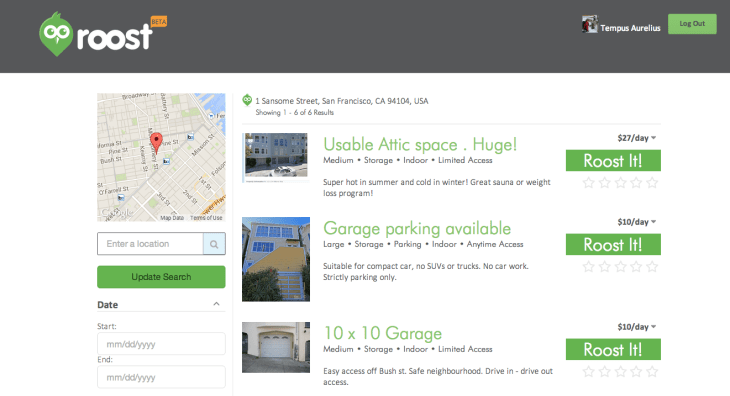Over the years we’ve seen peer-to-peer marketplaces pop up for pretty much every vertical. There’s Airbnb, which lets you rent out your home to other people, Getaround and Relayrides for car rentals, and even a couple for getting snow cleared from your driveway. And now there’s Roost, a peer-to-peer marketplace for self-storage.
The idea behind Roost is not that different from any of those other marketplaces: I’ve got something you can use, you pay me to use it. In this case, we’re talking about storage space, specifically storage space that can be found in your neighbor’s basement, or garage, or attic, or what have you.
The self-storage industry is a $24 billion opportunity! or so the slide deck says.* But until now, that industry has been defined by ominous storage lockers like the one where Clarise finds the remains of one of Buffalo Bill’s victims in Silence Of The Lambs or in reality TV shows where people outbid each other to sort through crap someone else left behind.
They’re private, sure, but they’re also expensive. And in most cases, they’re not exactly centrally located. In the San Francisco Bay Area, for instance, most of the more affordable units are either on Treasure Island or in the East Bay. And hey, that requires a rental car or truck to get your stuff to and from those places.
Anyway, Roost thinks it can provide a better, more affordable, and more convenient way to store your goods closer to your home by, um, putting them in someone else’s home. And if you live in a house or an apartment in the bay area that has a garage or some extra space, it’ll let you make money by keeping other people’s stuff there.
When you show up to the Roost website you can search for storage options by geographic location, as well as what kind of access you want — that is, whether you want your own key and full access to your stuff, or whether you’re ok with partial access, or letting the owner of the space know 48 hours ahead of time that you need the stuff in your storage area. You can also search by the size of the available space so that you can know if your old couch will fit or whatever.
Hosts have profiles with information about them, as well as public ratings and reviews so that renters can feel a level of trust and safety leaving their stuff in a stranger’s house. Those hosts are also background checked to ensure that they’re not going to steal your goods or sort through them or whatever. And there’s an insurance policy to cover anything that is broken, gets stolen, or goes missing.
Of course, Roost has a clear policy against storing anything illegal, stolen, flammable, or perishable — no embalmed heads for you, Dr. Lecter! — although co-founder and CEO Jon Gillon admits that criminals generally don’t read the terms and conditions before doing something nefarious. The good news is that the platform has each user’s credit card and identity in case something does go wrong.
Like Airbnb, the platform handles all payments, including recurring payments for long-term rentals, and makes sure they are automatically deposited into hosts’ bank accounts.
To start, Roost is launching in the San Francisco Bay Area, and admittedly there aren’t a ton of listings there right now. However, the company hopes to use its hometown as a testbed before opening up into other major urban markets like Boston, Chicago, Seattle, New York City, and Washington, D.C.
==
* I didn’t actually see a slide deck, just assuming there is one with that slide.
